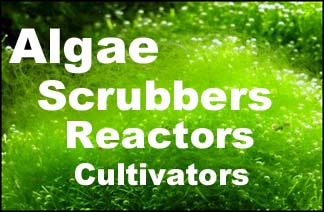1988:Wich timeline would that be?
Nutrient Cycling In The Great Barrier Reef Aquarium
http://www.reefbase.org/download/downlo ... ocid=10506
"The Reef Tank represents the first application of algal scrubber technology to large volume aquarium systems. Aquaria using conventional water purification methods (e.g. bacterial filters) generally have nutrient levels in parts per million, while algal scrubbers have
maintained parts per billion concentrations [much lower], despite heavy biological loading in the Reef Tank. The success of the algal scrubbers in maintaining suitable water quality for a coral reef was demonstrated in the observed spawning of scleractinian corals and many other tank inhabitants."
In 1988 they did not know that calcium needed to be added to a reef tank. Even five years after that, the Pittsburgh Zoo was just starting to test a "mesocosm" scrubber reef tank to see if calcium levels would drop:
1993:
An Introduction to the Biogeochemical Cycling of Calcium and Substitutive Strontium in Living Coral Reef Mesocosms
http://onlinelibrary.wiley.com/doi/10.1 ... 5/abstract
"It was hypothesized that Ca2+ and the substitutive elements Sr2+ and Mg2+ might [!] have reduced concentrations in a coral reef microcosm due to continuous reuse of the same seawater as a consequence of the recycling process inherent in the coral reef mesocosm."
"The scleractinians (Montastrea, Madracis, Porites, Diploria, and Acropora) and calcareous alga (Halimeda and others) present in the coral reef mesocosm are the most likely organisms responsible for the significant reduction in concentration of the Ca2+ and Sr2+ cations."
"Ca is not normally a biolimiting element, and strontium is never a biolimiting element;
HCO3 [alk] can be. It appears that, because of a minor [!] limitation in the design parameters of the mesocosm, these elements and compounds may have become limiting factors. [...] It is surprising that the organisms could deplete the thousands of gallons of seawater (three to six thousand) of these elements even within two or more years [!!].
"The calcification processes are little understood."
So then in the late 90's, the Barrier Reef aquarium start using up it's supply of calcium, and the folks there said "the corals grew poorly". Really. No calcium, and the corals grew poorly. So they "removed the scrubbers" and "experimented with the addition of calcium" sometime after 1998. Then in 2004 it "definitely improved a lot".
Talks about calcium was not added to barrier aq:
http://en.microcosmaquariumexplorer.com ... f_Aquarium
Algae has no promotion budget, and therefore nobody to speak for it. Manufactured aquarium devices, on the other hand, have very nice promotion budgets. And they hire people to pose as "regular hobbiest" who hate scrubbers. It's similar to the pharmaceutical companies who have cures to many human problems, but don't manufacture or sell them because they can't patent them. And since they don't promote them, nobody knows about them (except those to actively pursue such things).All in all, I do not find any argumentation that would be usefull except this scrubber forum and similar sites wich promote the use of these devices
Actually there is one big big negative: It removes profits from those who sell skimmers, filter socks, nitrate removers, gfo, salt, filter pads, vitamins, amino's, etc.There are simply no negative effects documented and verifiably assigned to the scrubbing method.
It's because skimmers have one of the largest promotion budgets (lighting and tanks do too, but they are not threatened by scrubbers). You can make anything a "hit" by promoting it enough. I know, it's my day job. If you promote it enough, it makes it look like "everyone is using it". Of course, you don't promote the negatives. How many skimmer ads tell you "removes coral food from the water"? That's what skimmers do... what do you think protein is? Why do you think coral food bottles say to "turn skimmers off for one hour" when feeding? But what happens the other 23 hours?... coral food continues to be removed, of course. Remember, there is no "skimmer" in the ocean. And no, the beach does not "skim". All the filtering in the ocean is done by algae. All of it.Just notice how little negative effects a skimmer is assigned and how widely it is applauded.



 Reply With Quote
Reply With Quote